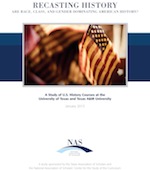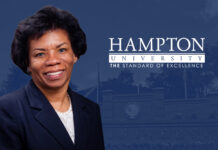 In 1971, legislators in the state of Texas passed a bill that requires students at public institutions of higher education in the state to complete two courses in American history. Recently the National Association of Scholars released a report about how students at the University of Texas and Texas A&M University are meeting the history requirement.
In 1971, legislators in the state of Texas passed a bill that requires students at public institutions of higher education in the state to complete two courses in American history. Recently the National Association of Scholars released a report about how students at the University of Texas and Texas A&M University are meeting the history requirement.
The study examined all 85 sections of lower-division American history courses at Texas A&M and the University of Texas in the fall 2010 semester that satisfied the U.S. history requirement. The assigned readings for each course and the research interests of the forty-six faculty members who taught them were also analyzed.
The authors of the report concluded, “We found that all too often the course readings gave strong emphasis to race, class, or gender social history, an emphasis so strong that it diminished the attention given to other subjects in American history such as military, diplomatic, religious, intellectual history. The result is that these institutions frequently offered students a less-than-comprehensive picture of U.S. history.”
The University of Texas responded with a statement that said in part that the NAS “paints a narrowly defined and largely inaccurate picture of the quality, depth and breadth of history teaching and research at the University of Texas at Austin, and it mischaracterizes how race, class and gender inform teaching and research in history.”
The university contends that it offers a broad scope of history courses and defends its offering on race, class and gender. “Teaching race, class and gender topics is not ideological, but rather true to the craft of history,” the statement said. “It helps broaden our understanding of American society by adding new voices and perspectives to the rich American story. It can make the study of history relevant to students’ lives, encourage lifelong learning and promote critical thinking.”
The NAS Report, Recasting History: Are Race, Class, and Gender Dominating U.S. History, can be downloaded here.
Jeremi Suri, the Mack Brown Distinguished Professor for Global Leadership, History, and Public Policy at the University of Texas at Austin, defends the university’s history curriculum in a blog post that can be viewed here.













I don’t agree because those three social categories, in addition to sexual orientation, in concert exert a powerfully determinant shape on the life course of not just juristic and natural persons, but also many other social institutions and every aspect of political society, economic society, and civil society. No individual teaches outside of social location or standpoint – including history teachers.
The (conservative) N Assn of Scholars emphasize the obvious and have nothing new to say. By comparison, U.S. History survey courses 20 or 30 years ago, and earlier, overdosed on White male political, social and intellectual themes. Where were the NAS when African Americans and women clamored for a more inclusive picture: Their silence was deafening and their privilege informed their blindness. And now they’re calling the kettle black. Hum…